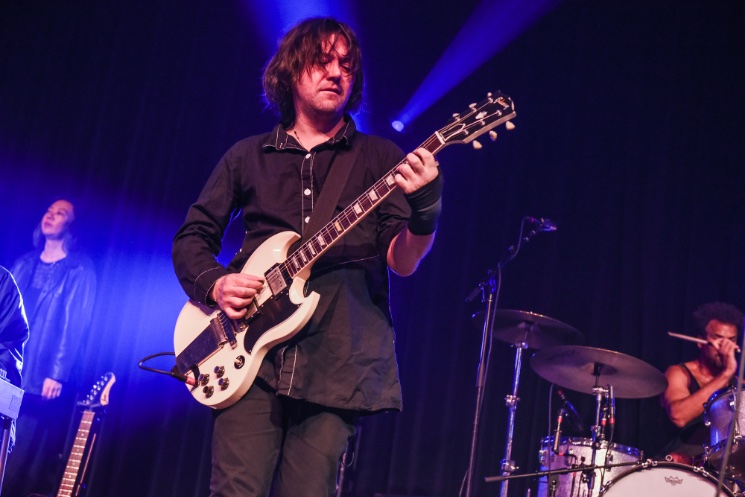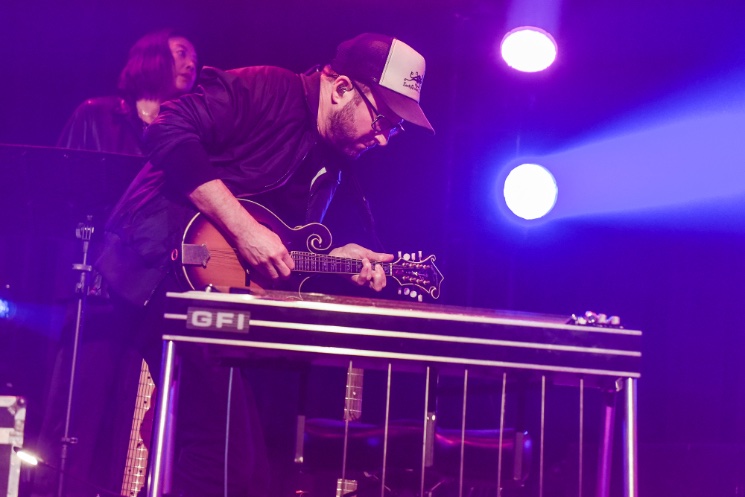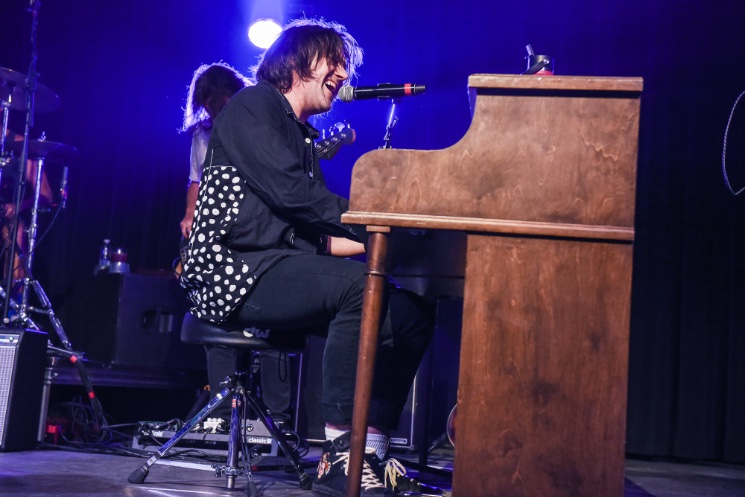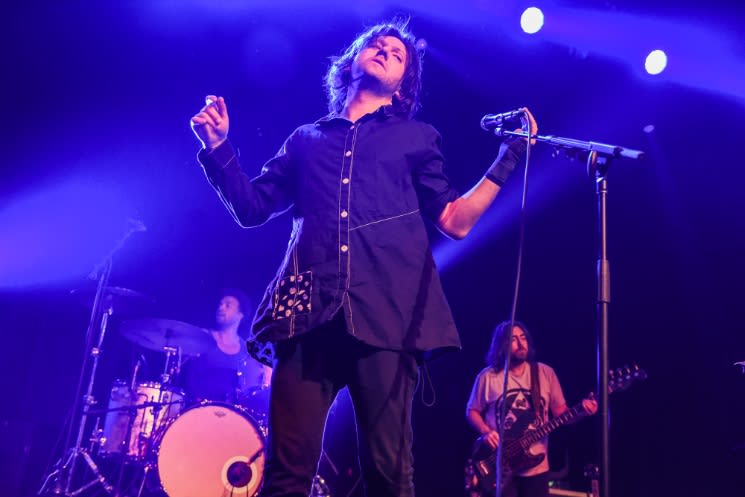"We're going to play a song I wrote when I was 15, and I just turned 64, so…" Conor Oberst told the crowd in Toronto, before trailing off and claiming, "I have dementia."
Such is the predicament that Oberst finds himself in these days: he's 42 years old and forced to constantly relive the raw-nerve emo anthems he penned as an angsty teen and early 20-something. He broke up Bright Eyes in 2011 to focus on solo work, but reunited the project in 2020 — and so now he's back to howl about George W. Bush and the chemical-induced depravity of youth.
But if Oberst has mellowed out since the tortured confessions of Bright Eyes' early years, he certainly didn't show it during his performance at the fairly full (but noticeably below capacity) History. Taking the stage with seven backing players — who brought the project's many stylistic eras to life with synths, violin, horns, mandolin, pedal steel and more — Oberst was decked out in all black, his oversized button-up making him look a bit like vampiric British Bake Off host Noel Fielding. Initially performing without an instrument — although he would play guitar or keyboard at various points through the night — Oberst twirled and whirled wildly, throwing shapes and miming lyrics as he ping-ponged across the stage. Rather than celebratory, his dancing had the erratic, might-topple-at-any-moment energy of Joaquin Phoenix's Joker prancing down the stairs.

Oberst made numerous references to going in a "time machine" to play old songs, but rather than pandering with a greatest hits set, the band cherry picked from their catalogue seemingly at random, mostly avoiding signature tunes in favour of deep cuts: they played "An Attempt to Tip the Scales" from 2000's Fevers and Mirrors, and dipped into 2005's I'm Wide Awake, It's Morning with the twangy "Old Soul Song (for the New World Order)" and the rollicking barnburner "Another Travellin' Song." They played multiple cuts from 2004's split EP One Jug of Wine, Two Vessels and 2011's The People's Key, respectively, but completely avoided 2007's Cassadaga, making it hard to understand the setlist's logic. This was frustrating when he skipped a classic song (like "At the Bottom of Everything," "Bowl of Oranges" or "Four Winds"), but it gave the setlist a sense of authenticity, as if Oberst was choosing the material closest to his heart. He's a legacy artist, but he still seems to mean it.
Whether dabbling in climactic folk rock on "Poison Oak," locking into electronic textures on a cuts from 2005's Digital Ash in a Digital Urn, or tearing into fuzzed-up rock on the uncharacteristically chipper "Jejune Stars," Oberst's seven backing players were rock solid, with drummer Jon Theodore (of Queens of the Stone Age) blasting through drum fills that were as precise as they were thunderous, and guitarist Mike Mogis doing some nimble two-hand tapping at one point.

The band's proficiency was in stark contrast to the frontman, whose off-the-rails stage presence lent the songs an air of conviction while sometimes being a little difficult to watch. I can't confirm exactly what he was drinking up there, but he amassed a collection of four or five cups over the course of the near-two-hour set, and his between-song monologues grew increasingly rambling. At one point, he discussed how the friend he wrote the song "Lua" about had died — not that they played "Lua," mind you.
During the encore, Bright Eyes finally attempted a crowd-pleaser, playing a gentle singalong version of "The First Day of My Life." The crowd knew every word — but Oberst didn't, as he completely flubbed the second chorus and had to start over from the second verse.

Soon after, Oberst introduced the final song, promising it was a life-affirming song that best crystallized his music's ultimate message of compassion and unity. "I've got so many cynical, shitty, depressing songs, and this is the one that's least like that," he said. This turned out to be "One for Me, One for You" — a song that found Oberst miming a gunshot to his head while singing about suicide, and includes a line about a Führer and his child bride. It's certainly not the comforting song he thinks it is. But, as he spun and tumbled around the stage, there was a certain joyful freedom in the way he seemed to relish in despair.
Such is the predicament that Oberst finds himself in these days: he's 42 years old and forced to constantly relive the raw-nerve emo anthems he penned as an angsty teen and early 20-something. He broke up Bright Eyes in 2011 to focus on solo work, but reunited the project in 2020 — and so now he's back to howl about George W. Bush and the chemical-induced depravity of youth.
But if Oberst has mellowed out since the tortured confessions of Bright Eyes' early years, he certainly didn't show it during his performance at the fairly full (but noticeably below capacity) History. Taking the stage with seven backing players — who brought the project's many stylistic eras to life with synths, violin, horns, mandolin, pedal steel and more — Oberst was decked out in all black, his oversized button-up making him look a bit like vampiric British Bake Off host Noel Fielding. Initially performing without an instrument — although he would play guitar or keyboard at various points through the night — Oberst twirled and whirled wildly, throwing shapes and miming lyrics as he ping-ponged across the stage. Rather than celebratory, his dancing had the erratic, might-topple-at-any-moment energy of Joaquin Phoenix's Joker prancing down the stairs.

Oberst made numerous references to going in a "time machine" to play old songs, but rather than pandering with a greatest hits set, the band cherry picked from their catalogue seemingly at random, mostly avoiding signature tunes in favour of deep cuts: they played "An Attempt to Tip the Scales" from 2000's Fevers and Mirrors, and dipped into 2005's I'm Wide Awake, It's Morning with the twangy "Old Soul Song (for the New World Order)" and the rollicking barnburner "Another Travellin' Song." They played multiple cuts from 2004's split EP One Jug of Wine, Two Vessels and 2011's The People's Key, respectively, but completely avoided 2007's Cassadaga, making it hard to understand the setlist's logic. This was frustrating when he skipped a classic song (like "At the Bottom of Everything," "Bowl of Oranges" or "Four Winds"), but it gave the setlist a sense of authenticity, as if Oberst was choosing the material closest to his heart. He's a legacy artist, but he still seems to mean it.
Whether dabbling in climactic folk rock on "Poison Oak," locking into electronic textures on a cuts from 2005's Digital Ash in a Digital Urn, or tearing into fuzzed-up rock on the uncharacteristically chipper "Jejune Stars," Oberst's seven backing players were rock solid, with drummer Jon Theodore (of Queens of the Stone Age) blasting through drum fills that were as precise as they were thunderous, and guitarist Mike Mogis doing some nimble two-hand tapping at one point.

The band's proficiency was in stark contrast to the frontman, whose off-the-rails stage presence lent the songs an air of conviction while sometimes being a little difficult to watch. I can't confirm exactly what he was drinking up there, but he amassed a collection of four or five cups over the course of the near-two-hour set, and his between-song monologues grew increasingly rambling. At one point, he discussed how the friend he wrote the song "Lua" about had died — not that they played "Lua," mind you.
During the encore, Bright Eyes finally attempted a crowd-pleaser, playing a gentle singalong version of "The First Day of My Life." The crowd knew every word — but Oberst didn't, as he completely flubbed the second chorus and had to start over from the second verse.

Soon after, Oberst introduced the final song, promising it was a life-affirming song that best crystallized his music's ultimate message of compassion and unity. "I've got so many cynical, shitty, depressing songs, and this is the one that's least like that," he said. This turned out to be "One for Me, One for You" — a song that found Oberst miming a gunshot to his head while singing about suicide, and includes a line about a Führer and his child bride. It's certainly not the comforting song he thinks it is. But, as he spun and tumbled around the stage, there was a certain joyful freedom in the way he seemed to relish in despair.




